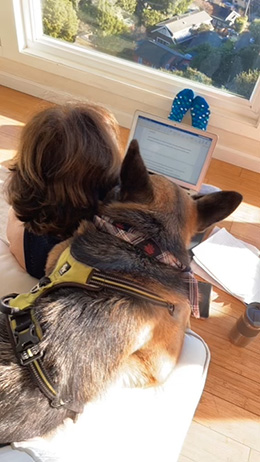
More about writing
Writing Routine
I love to write. I love when the words flow from my fingertips. It thrills me when my characters begin to talk to me and I can’t type fast enough to get their dialogue down. I adore polishing each sentence until it has just the rhythm and cadence; the snap, crackle pop I’m looking for. There’s an endorphin high that comes when a really good idea pops into my head. It’s easily as wonderful as German Chocolate Cake, a ride on an elephant or a trip to Paris.
Maybe because I came out of advertising writing, I don’t have a writing discipline problem. I got used to going to work every day and writing from nine to six so that routine seems normal to me. But it didn’t always. When I first started writing advertising it was really challenging to write all day. I remember confessing to a colleague about how slow and tortured the process was for me. And she said: “It will either get faster and easier or you’ll find something else to do.”
Obviously she was right. Writing is like running or weight lifting. You have to develop the muscles for it. It took me a year of writing forty plus hours a week before I found my groove. And now I consider it a really crappy day if I haven’t tucked myself inside my protagonist for the better part of the day.
What’s been more difficult for me in the last few years is balancing marketing writing and the real thing. Marketing writing, as I define it, is speech writing, presentation prep, web site writing, blog writing, Q&A writing, newsletter writing, answering emails etc. I only get so much writing juice every day and I have to manage my time so that I don’t squander the mojo doing marketing writing. Not that marketing writing isn’t important — but I could easily — oh so easily — have no time for the juicy stuff.
So what then is my routine like? Generally, I do my creative work first thing and then at the end of the day I answer emails and do marketing writing. But sometimes I’ll answer a few emails first thing to get myself warmed up and then get going on the books. Some weeks I get absolutely no business writing done at all and my email inbox gets clogged with red exclamation marks. Then, I’ll have to take the day off from my book and get caught up. But I try not to let that happen, because it makes my characters stamp their little feet and bang their little fists on the inside of my skull.
While I’m writing, I do have little rules around the internet. I’m allowed to check my email, but not return it unless it’s from my editor or agent and I’m not allowed to surf the net. I try to keep a list of things I need to research, and then at the end of the day I’ll go online and find what I need. I’m not rigid about this discipline, but I find it to be a useful guide.
I know a lot of authors do word or page counts. I’m a huge fan of the work of both Linda Sue Park and Katherine Paterson, so you can imagine my delight when I had dinner with Linda a year or so ago and she told me the writing routine she learned from Katherine Paterson. As Linda explained this to me, you start your writing day by revising yesterday’s pages and then generate two new pages. That’s it.
I decided to give it a try. And as it turns out I write many more than two pages a day. In fact, I blew through that novel. Whoa. Fastest novel I’ve ever written. The only problem was … the novel stunk. Yep. Big time bad. And not the kind of cruddy first draft bad that Annie Lamott talks about in her terrific book Bird by Bird either.
Does this mean I’m going to dump this work? Nope. But because I went so far with it, before it was ready to be written, the revision process is going to be a lot more like starting over than it will be about building on what I have.
It turns out what works for me is time. I need to make certain I block out uninterrupted hours to write or research whatever novel I am currently working on. The key for me is to feel my way along — like I’ve been dropped in a strange building on an unknown street in a country I’ve never been before in the dead of night — and slowly I must feel my way building the world of my novel as I go. The problem with artificial page generation goals is they encourage me to solve plot and character problems quickly instead of well.
What works for me is: trusting myself and my process. What works for me is making sure I keep the world and its demands at bay so that I have the space I need to write the best books I know how to write.

